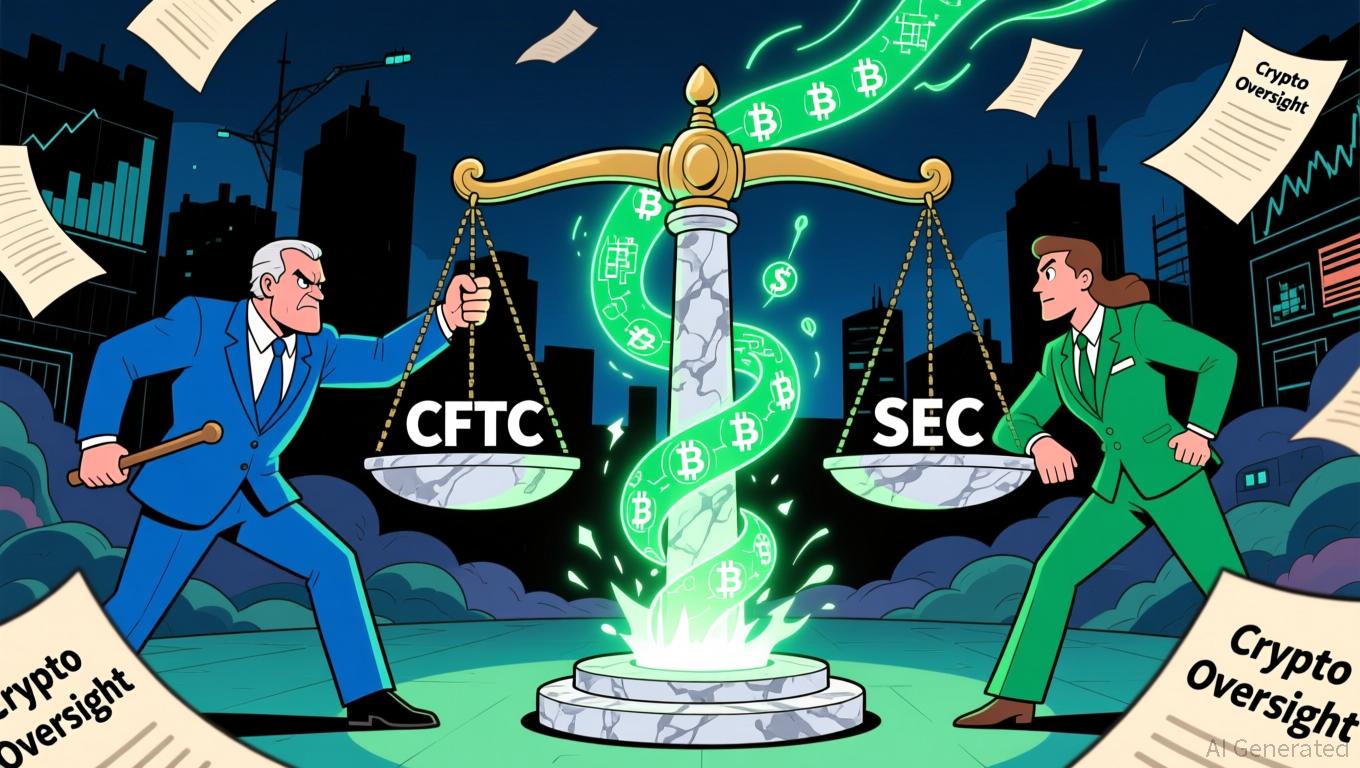Bitcoin News Update: CFTC's Broader Role in Crypto Regulation Ignites Discussion on Clearer Rules
- U.S. lawmakers propose expanding CFTC's crypto oversight via a bill reclassifying spot trading, diverging from SEC's enforcement approach. - Harvard University invests $443M in BlackRock's IBIT ETF, reflecting institutional confidence in crypto as a legitimate asset class. - DeFi projects like Mutuum Finance raise $18.7M in presales, leveraging regulatory momentum and transparent on-chain credit systems. - RockToken's infrastructure-backed crypto contracts attract long-term investors with structured yiel
The regulatory environment for cryptocurrencies in the United States is experiencing a significant transformation as legislators and industry leaders push for the Commodity Futures Trading Commission (CFTC) to take on a more expansive role in overseeing digital assets. This shift is exemplified by a new crypto market structure bill put forward by Senators John Boozman and Cory Booker, which aims to place spot digital commodity trading under the CFTC’s authority, moving away from the Securities and Exchange Commission’s (SEC) current enforcement-centric strategy.

There is also a notable rise in institutional interest in cryptocurrencies, with major entities such as Harvard University’s $55 billion endowment making significant investments. The endowment recently revealed a $443 million holding in BlackRock’s
RockToken, a New Zealand-based platform specializing in infrastructure-backed crypto investment contracts, is also attracting attention from long-term investors. The company offers a range of plans—from the entry-level “Genesis Pass” to the premium “Whale Reserve” contracts—enabling users to earn yields on Bitcoin,
Market trends are pointing toward cautious optimism. The conclusion of a 43-day U.S. government shutdown in November 2025 brought temporary stability to crypto markets, with Bitcoin recovering above $102,000. Experts attribute this rebound to renewed regulatory clarity as both the SEC and CFTC resumed their activities. Blockchain data also shows that long-term investors are accumulating assets, with over $1.3 billion in Ethereum acquired by large holders, indicating sustained confidence in crypto despite short-term price swings
This regulatory evolution is not without its hurdles. Some critics caution that overlapping responsibilities between the SEC and CFTC could lead to regulatory confusion, though advocates believe the proposed legislation will create a more streamlined oversight process. Bernstein analysts, however, maintain that the U.S. is well-placed to emerge as a global leader in crypto, citing its robust infrastructure and flexible regulatory approach. Together with increased institutional involvement and DeFi advancements, these factors could reshape the role of crypto in the international financial system
Disclaimer: The content of this article solely reflects the author's opinion and does not represent the platform in any capacity. This article is not intended to serve as a reference for making investment decisions.
You may also like
Bitcoin News Update: DeFi Faces Liquidity Challenges Amid Bitcoin Falling Under $100K
- Bitcoin's drop below $100K triggered DeFi liquidity crises, with $650M in leveraged positions liquidated as automated stop-losses activated. - Wrapped Bitcoin (WBTC) integrated with Hedera blockchain to reduce MEV and frontrunning, aiming to inject liquidity into DeFi protocols. - Hyperion DeFi reported 60% MoM validator growth and new partnerships, emphasizing staking yields over leveraged positions to avoid market volatility. - Analysts like Tom Lee predict 6-8 weeks for recovery, contingent on stabili

Assessing How Recent Ecosystem Enhancements Influence Trust Wallet Token (TWT) Price Forecasts
- Trust Wallet's Q4 2025 upgrades expanded TWT's utility through FlexGas (gas fee payments) and Trust Premium loyalty incentives, transforming it from governance to transactional token. - TWT surged 129% to $1.6 by October 2025, fueled by Binance CZ's endorsement and institutional validation of its ecosystem-driven value proposition. - The token's growth aligns with multi-token economy trends, emphasizing cross-utility, stability, and transparency through fixed supply models and public audits. - While regu

Astar (ASTR) Price Rally: Cross-Chain Compatibility Fuels Altcoin Value Growth
- Astar (ASTR) surged in late 2025 due to strategic blockchain interoperability advancements and partnerships. - Collaboration with HTX includes TGE Catalyst Grants, listing acceleration, and CEX partnerships to boost DeFi adoption. - Astar 2.0's zkEVM and CCIP integration achieved 150,000 TPS, targeting 300,000 TPS by 2025 with enterprise partnerships. - Interoperability-driven projects like Astar are reshaping altcoin valuations, aligning with growing institutional DeFi demand.

Astar 2.0 Debut and Its Impact on the Blockchain Landscape
- Astar 2.0 emerges as a strong contender in institutional blockchain adoption through Polkadot-based scalability and interoperability innovations. - Institutional confidence grows with $3.16M ASTR purchase, 20% QoQ wallet growth, and partnerships with Sony , Casio, and Japan Airlines. - Astar's 6-second block time, 150k TPS throughput, and Chainlink CCIP integration contrast with Bitcoin/Ethereum's scalability struggles and ETF outflows. - Projected $0.80–$1.20 ASTR price by 2030 hinges on Evolution Phase
